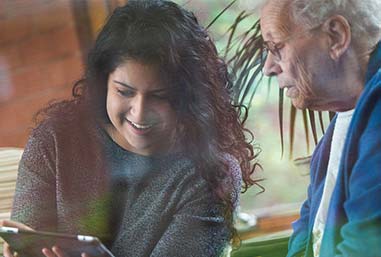Sabrina's Mission
By Megan Jonas
Sabrina Votava's dedication to suicide prevention began with immense personal loss. In 2003, when she was a college freshman, two of her older brothers died by suicide six months apart.
"I wanted to research and understand what happened," says Votava M.A. '19. "I couldn't fully grasp how they could leave us."
The more she learned, the more she wanted to help others understand suicide – and prevent other families from experiencing the devastation hers had. This led Votava to earn her bachelor's degree in public health and begin working in suicide prevention.
"I've always been a teacher," she says. "I enjoy helping people understand something that's confusing, especially something that's confusing and difficult like suicide."
After sensing a need in her native Spokane for more suicide-prevention resources, Votava decided in 2016 to start her own community organization. FailSafe for Life's mission is to end suicide through connection, education and hope.
"I think everybody has a role in suicide prevention," she says, "and it's a matter of identifying what that part is."
Votava's organization offers free and low-cost prevention trainings geared toward community members and professionals. FailSafe for Life has already trained hundreds of people to recognize when someone is in crisis and to intervene effectively.
Votava says many people attend the trainings because they have noticed the prevalence of suicide and want to know how to help.
According to the Centers for Disease Control, suicide is the nation's 10th leading cause of death, and rates have increased steadily in recent years.
"Suicide is coming into view for more people now," she says. "We've made progress on other diseases, but not this."
This spring, Votava earned her master of arts in social & behavioral health at Whitworth, making her eligible for a license in mental health counseling. She is interested in helping individuals as a counselor while continuing to serve the community through FailSafe for Life.
"I like the idea that I could work on a micro and macro level," she says. "I could help people through difficult things, but then on a larger scale I could make social change."
While her brothers' deaths started Votava on this path, her faith keeps her going.
"I feel very much called to this work," she says. "It's difficult, but God gives me the strength to pursue it."
The National Suicide Prevention Lifeline is available 24/7 at 800.273.8255.
Votava's story appears in the spring 2019 issue of Whitworth Today magazine.
Recognize the Warning Signs
Sabrina Votava says one of the ways you can help prevent suicide is by learning to recognize the warning signs. She recommends becoming aware of the following F.A.C.T.S.:
Feelings: Is the person sad, lonely, hopeless, in pain, irritable or increasingly depressed?
Actions: Are they pushing away from friends and family, giving away important possessions, abusing drugs or alcohol, or making or researching suicide plans?
Changes: Have there been changes in performance, appearance or hygiene, or personality or attitude, or does the person not seem like they normally do?
Threats: Have they directly said they are going to kill themselves or indirectly talked about dying? Do they say things like, "I wish I could go to sleep and never wake up"; "Pretty soon, you won't have to worry about me"; or "I'm tired of life and can't go on"?
Situations: Has a crisis or situation occurred recently that was a loss for them?
If you have concerns about someone and aren't sure what to do, call your local or national crisis line for support.

